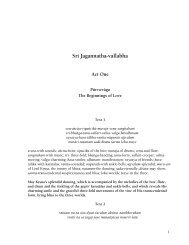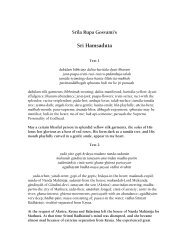Srimad Bhagavatam, Volume 3
Srimad Bhagavatam, Volume 3
Srimad Bhagavatam, Volume 3
You also want an ePaper? Increase the reach of your titles
YUMPU automatically turns print PDFs into web optimized ePapers that Google loves.
pleasure of the Lord and this action is called Yoga karmasya kousalam or<br />
actions may be performed keeping link with the Supreme Lord. That is the art<br />
of doing a thing perfectly.<br />
Jaloukasam jale yadbat mahanto'danti aniyasah<br />
Druvalan Valino rajan mahanto valino mitho<br />
Evam valisthair yadubhi mahadbhir itaram bibhuh<br />
Yadun yadubhir anyonyam bhubharam samjahara<br />
Jaloukasam—of the acquatics, Jale—in the water, Yadbat—as it is,<br />
Mahanto—the larger one, Odanti—swallows, Aniyasah—smallers ones,<br />
Durvalan—the weak, Valino—the stronger, Rajan—oh the king, Mahanto—<br />
the strongest, Valino—lesser strong, Mitho—in duel, Evam—thus,<br />
Valisthair—by the strongest, Yadubhir—by the descendants of Yadu,<br />
Mahadbhir—one who has greater strength, Itaran—the common ones,<br />
Bibhuh—the Supreme Personality of Godhead, Yadun—all the Yadus,<br />
Yadubhir—by the Yadus, Anyonyam—between one another, Bhubharan—the<br />
burden of the world, Samjahara—has unloaded, Ha—in the past.<br />
Oh the King! as it is in the ocean the stronger acquatic swallows up the<br />
weaker ones, the bigger one swallows up the smaller ones so also the<br />
Supreme Personality of Godhead has unloaded the burden on the earth<br />
by engaging the stronger Yadu for killing weaker and bigger Yadu in<br />
killing the smaller.<br />
In the material world the law of struggle for existence and survival of the<br />
fittest work for the reason that in the material world there is disparity between<br />
the conditioned souls on account of every one's desire to lord it over the<br />
material resources. This very mentality of lording it over the material nature is<br />
the root cause of conditioned life. And to give facility to such imitation sense<br />
of lordship the illusary energy of the Lord has created a disparity between<br />
conditioned living beings by creating the stronger and the weaker in every<br />
species of life. The mentality of lording it over the the material nature and the<br />
creation of the strong and the weak has naturally created a disparity and<br />
therefore the law of struggle for existence. In the spiritual world there is no<br />
such disparity neither there is such struggle for existence because every one<br />
there exists eternally. There is no disparity because overy one wants to render<br />
service to the Supreme Lcrd and bo body wants to imitate the Lord in the<br />
matter of becoming the beneficiary. The Lord being creater of everything<br />
including the living beings, factually He is the proprietor and enjoyer of<br />
everything that be but in the material world by the spell of Maya or illusion<br />
this sense of eternal relation with the Supreme Personality of Godhead being<br />
forgotten the living being is conditioned under the law of struggle for<br />
existence and survival of the fittest.<br />
Desha kala artha yuktani hrit tapo upasamani cha<br />
Haranti smaratas chittam govinda abhihitani me.<br />
Desha—space, Kala—time, Artha—importance, Yuktani—impregnated with,<br />
Hrit—the heart, Tapa—burning, Upasamani—extinguishing, Cha—and,<br />
Haranti—are attracting, Smaratas—by remembering, Chittam—mind,<br />
Govinda—the Supreme Lord of pleasure, Abhihitani—narrated by, Me—unto<br />
me.<br />
Now I am being attracted by the instructions which were imparted to me<br />
by the Personality of Godhead because they are always impregnated with<br />
instruction for relief to the burning heart of all in all circumstances of<br />
space and time.<br />
Herein Arjuna refers to the instruction of the Bhagwat Geeta which was<br />
imparted to him by the Lord in the battlefield of Kurukshetra. The Lord left<br />
behind Him the instructions of the Bhagwat Geeta not only for the benefit of<br />
Arjuna alone, but also it is useful for all at all time and in all climate or space.<br />
The Bhagwat Geeta being spoken by the Supreme Personality of Godhead, it<br />
is the essence of all vedicwisdom. It is nicely presented by the Lord Himself<br />
for all who have very little time for going through the vast vedic-literatures<br />
like the Upanishads, Puranas and Vedanta Sutras. It is put within the study of<br />
the great historical epic Mahabharata which was specially prepared for the<br />
less intelligent class of men namely the women, the labourer class of men and<br />
those who are worthless descendants of the higher class men of the society<br />
namely the Brahmins, Kshatriyas and higher section of the Vaishyas. The<br />
problem, which arose some times in the heart of Arjuna in the battle field of<br />
Kurukshetra, was solved by the teachings of the Bhagwat Geeta and again<br />
after the departure of the Lord from the vision of the earthly people, when<br />
Arjuna was face to face with another problem of being vanquished in his<br />
acquired power and prominence, he wanted again to remember the great<br />
teachings of the Bhagwat Geeta just to teach all concerned that the Bhagwat<br />
Geeta could be consulted in all critical time not only to be solaced from all<br />
kinds of mental agonies but also to find out the way out of the great<br />
entanglement which might have embarassed one in some critical hour.<br />
The merciful Lord left behind Him the great teachings of the Bhagwat<br />
Geeta for the only reason that one could take the instructions of the Lord even<br />
during the time of His not being visible to the material eyesight. Material<br />
senses cannot have any estimation of the Supreme Lord but by his<br />
inconceivable power, the Lord can incarnate Himself to the sense-perception<br />
27<br />
Fifteenth Chapter - The Pandavas Retire Timely<br />
of the conditioned souls in a suitable manner through the agency of matter<br />
which is also another form of Lord's energy of manifestation. As such the<br />
Bhagwat Geeta or any such authentic scriptural sound representation of the<br />
Lord is also incarnation of the Lord. There is no difference between such<br />
sound representation of the Lord and Himself and one can derive the same<br />
benefit from the Bhagwat Geeta as Arjuna had it done in the personal<br />
presence of the Lord.<br />
Faithful human being who is desirous of being liberated from the clutches<br />
of the illusory energy of material existance, can take very easily the<br />
transendental advantage of the Bhagwat Geeta and with this mission in view<br />
the Lord instructed Arjuna as if Arjuna was in need of it. In the Bhagwat<br />
Geeta five important factors of knowledge have been delineated pertaining to<br />
the (l) Supreme Lord, (2) the living being, (3) the Nature, (4) the time and<br />
space and (5) the process of activity. Out of these, the Supreme Lord and the<br />
living being, being qualitatively one, the difference between the two have<br />
been analysed as the whole and the part and parcel. The nature is inert matter<br />
displaying the interaction of three different modes and the eternal time and<br />
unlimited space are considered to be beyond the existence of the material<br />
nature. Activities of the living being are different varieties of aptitudes which<br />
can entrap or liberate the living being within or without the material nature.<br />
All these subject matters are concisely disscussed in the Bhagwat Geeta and<br />
later the subject matters are elaborated in the <strong>Srimad</strong> Bhagwatam for further<br />
enlightenment. Out of the five subjects, the Supreme Lord, the living entity,<br />
the Nature and time and space all are enternal but the living entity, nature and<br />
time all of them are under the direction of the Supreme Lord who is Absolute<br />
and completely independant of any other control. The Supreme Lord is the<br />
supreme controller. Activity of the living being is beginningless but it can be<br />
rectified by transferred epithet into spiritual quality and thus cease its material<br />
qualitative reactions. Both the Lord and the living entity are cognisant and<br />
both have the sense of identification of being conscious as living force. But<br />
the living being under the condition of the material nature called the Mahat<br />
Tattwa misidentifies himself as different from the Lord and the whole scheme<br />
of vedic wisdom is targetted to this aim of eradicating such misconception of<br />
the living being and thus to liberate him from the illusion of material<br />
identification. When such illusion is eradicated by knowledge and<br />
renunciation the living being revives his real identification as interested<br />
individual being in the transcendental position of the Lord. As conscious<br />
beings both the Lord and the living being are responsible actors and enjoyer<br />
also. The sense of enjoyment in the Lord is real but such sense in the living<br />
being is a sort of wishful desire only. This difference in consciousness is the<br />
criterian of two identities namely the Lord and the living being. Otherwise<br />
there is no difference between the Lord and the living being. The living being<br />
is therefore, eternally one and diffierent simultaneously. The whole<br />
instructions of the Bhagwat Geeta stand on the basis of this principle.<br />
In the Bhagwat Geeta the Lord and the living being both have been<br />
described as Sanatan or eternal and the Lord's abode far beyond the range of<br />
material sky is also described as Sanatan. The living being is invited to live in<br />
the Sanatan existence of the Lord and the process which can help a living<br />
being to approach the Lord's abode as abovementioned, is called the Sanatan<br />
Dharma or the place where the liberated activity of the soul is exhibited. One<br />
cannot, however, reach the eternal abode of the lord without being free from<br />
the misconception of material identification and the Bhagwat Geeta gives us<br />
the clue how to achieve this stage of perfection. The process of being liberated<br />
from the misconception of material identification is called, in different stages,<br />
as fruitive activity, emperic philosophy and devotional services up in the<br />
matter of transcendental realisation. Such transcendental realisation is made<br />
possible by dovetailing all the above items in relation with the Lord.<br />
Prescribed duties of the human being as they are directed in the Vedas, can<br />
gradually purify the sinful mind of the conditioned soul and raise him to the<br />
stage of knowledge. Such purified stage of acquiring knowledge becomes the<br />
basis of devotional service of the Lord. So long one is engaged in the matter<br />
of researching the solution of the problems life, it is called Jnana or purified<br />
knowledge but on the stage of realising the actual solution of life, one is<br />
called as situated in the dovotional service of the Lord. The Bhagwat Geeta<br />
begins with the problems of life by discreminating the soul from the elements<br />
of matter and proves it by all reasons and arguments that the soul is<br />
indestructible at all circumstances and the outer cover of matter the body and<br />
the mind change covering for another term of material existence which is full<br />
of miseries. The Bhagwat Geeta is therefore meant for terminating all<br />
different types of miseries and Arjuna took shelter of the great knowledge<br />
which was imparted to him before, during the time of Kurukshetra battle.<br />
Suta uvacha:<br />
Evam chintayato jishnoh krishnapada saroruham<br />
Souhardena atigadhena santay asit vimala matih.<br />
Suta uvacha—Suta Goswami said, Evam—thus, Chintayato—while thinking<br />
of the instructions, Jishnoh—of the Supreme Personality of Godhead,<br />
Krishnapada—feet of Krishna, Saroruham—resembling tbe lotus,<br />
Souhardena—by deep friendship, Atigadhena—in great intimacy, Santa—












